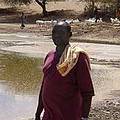 科學家警告,氣候變遷是人類有史以來遭遇最嚴重的挑戰後,6日在肯亞奈洛比召開的聯合國氣候變遷會議,就極力呼籲世界各國應採取行動,以控制全球暖化現象,並對急需調適的開發中國家提供援助。
科學家警告,氣候變遷是人類有史以來遭遇最嚴重的挑戰後,6日在肯亞奈洛比召開的聯合國氣候變遷會議,就極力呼籲世界各國應採取行動,以控制全球暖化現象,並對急需調適的開發中國家提供援助。
12屆聯合國「氣候變化綱要公約」(UNFCCC)暨第二次京都議定書會議第一次在非洲撒哈拉沙漠以南地區舉辦,此次聯合國氣候高峰會議為期2週,預計有約5000名的參與者。氣候變化綱要公約有189個國家簽署,而京都議定書簽署國共有166個。由於這是第一次世界級氣候變遷會議在非洲撒哈拉沙漠以南舉辦,大會特別關注非洲及其他開發中國家的需求。另一個重要的議程主題是討論在2012年之後,也是京都議定書協議到期時,國際團體應該如何做進一步的行動,來與氣候變遷搏鬥。此次會議也將重新審查議定書的內容。
5日聯合國報告中發出警告,全球暖化將對數十億全世界最貧困民眾的發展造成威脅,估計約30%的非洲海岸建設,將因為全球暖化所帶來的海平面上升所淹沒,包括幾內亞灣、塞內加爾、甘比亞和埃及的海岸居住地區。UNFCCC祕書處發布資料表示,聯合國環境規畫署(UNEP)和國際氣象組織(WMO)的資料說明,到2085年,非洲將損失約25%,甚至超過40%的物種棲地。UNFCCC執行秘書德布爾(Yvo de Boer)呼籲通過特別行動計畫,以五年時間來因應氣候變遷所帶來的衝擊、易受破壞、與適應等問題。
會議另一項預期的重要結果是,通過UNFCCC「適應基金」的使用。這筆基金是由京都議定書的清潔發展機制過程所籌措。清潔發展機制允許簽署京都議定書的工業國家,投資開發中國家之永續發展的計畫,因此獲得可交易的溫室氣體排放額度。
聯合國環境規劃署執行長史坦能(Achim Steiner)表示:「氣候變遷正在持續發生,國際團體必須對面臨不斷增加衝擊威脅的前線國家伸出援手,這些國家遭遇像是海平面上升而對基礎建設造成威脅,以及極度乾旱與洪水等現象。」
Energized by a warning that climate change is one of the greatest challenges in the history of humankind, the United Nations Climate Change Conference - Nairobi 2006 opened today with calls for action to limit global warming and assistance for developing countries that must adapt.
The two week conference, the twelfth Conference of the 189 Parties to the United Nations Framework Convention on Climate Change, UNFCCC, and the second meeting of the 166 Parties to the Kyoto Protocol, is the first UN climate summit in sub-Saharan Africa. It is expected to draw around 5,000 participants.
Because this is the first world climate change conference held in sub-Saharan Africa, it will have a special focus on the needs of Africa and other developing countries. The other key agenda topic will be discussion of what further action the international community should take to combat climate change after 2012, when the Kyoto Protocol emission targets expire. The conference also will conduct a review of the Protocol.
Warning that global warming threatens the development goals for billions of the world's poorest people, A UN report released Sunday warns that an estimated 30 percent of Africa's coastal infrastructure could be inundated by rising sea levels linked to global warming, including coastal settlements in the Gulf of Guinea, Senegal, Gambia and Egypt.
Released by the UNFCCC Secretariat and based on data from such agencies as the UN Environment Programme, UNEP, and the World Meteorological Organization, WMO, the report projects that that between 25 percent and over 40 percent of species' habitats in Africa could be lost by 2085.
UNFCCC Executive Secretary Yvo de Boer called for specific activities to be agreed within the five-year work plan on impacts, vulnerability and adaptation.
Another key outcome expected of the conference is agreement on how to manage the UNFCCC's Adaptation Fund. The Fund is financed by a share of proceeds generated by the Kyoto Protocol's clean development mechanism, CDM fs.
The CDM permits industrialized countries which are members of the Protocol to invest in sustainable development projects in developing countries, and thereby generate tradable emission credits.
"Climate change is underway," said UNEP Executive Director Achim Steiner, "and the international community must respond by offering well-targeted assistance to those countries in the front-line which are facing increasing impacts such as extreme droughts and floods and threats to infrastructure from phenomena like rising sea levels."







